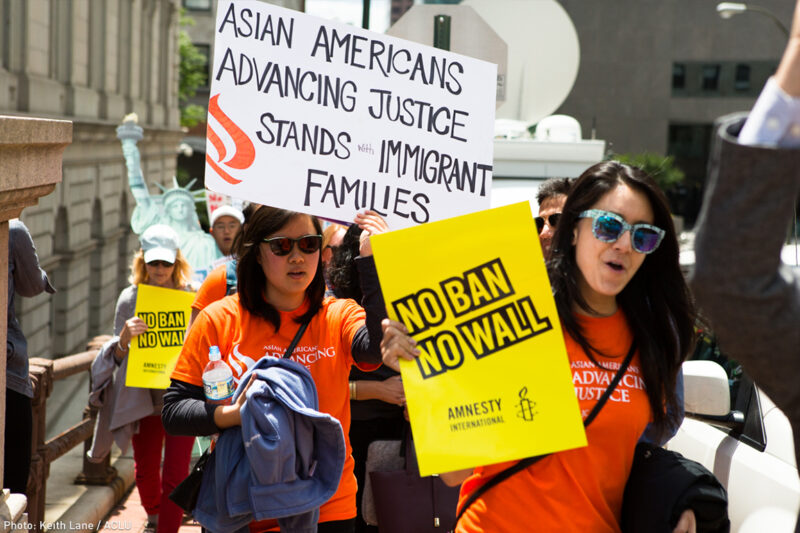
As the gavel sounded on Monday afternoon, the Richmond, Virginia, courtroom quieted. In a room of rich green carpet, great hanging chandeliers, and dark wood, the Fourth Circuit prepared to listen to a lawyer from the government argue with the ACLUÔÇÖs Omar Jadwat about the Muslim ban.
Outside, a couple hundred protesters marched around the courthouse shouting, ÔÇťNo hate, no fear, Muslims are welcome here!ÔÇŁ
ÔÇťMy great-grandparents were immigrants,ÔÇŁ said Louis Gary, 59, an IT manager from Henrico County, Virginia, saying he thought it was ÔÇťfoolishÔÇŁ to categorize all citizens of six Muslim-majority countries as a threat.
Inside, some 13 judges ÔÇö the entire Fourth Circuit, minus two judges who recused themselves ÔÇö fired questions at attorneys about the Muslim ban. Normally, a three-judge panel would hear the case, but the court of appeals decided to bypass normal procedures and have the whole circuit weigh in on whether or not President TrumpÔÇÖs executive order violates First Amendment prohibitions against the governmentÔÇÖs denigration of a religion.
Maryland U.S. District Court Judge Theodore D. Chuang had written in his March ruling that the ÔÇťhistory of public statements continues to provide a con┬şvincing case that the purpose of the Second Executive Order remains the realization of the long-envisioned Muslim ban.ÔÇŁ
On Monday, the Fourth Circuit judges barraged government attorney Jeffrey B. Wall, the acting U.S. solicitor general, with questions about whether they should consider campaign promises Trump made to ban Muslims from entering the U.S.
ÔÇťWhat he said was that Islam hates us. He said we have a problem with Muslims in the United States.ÔÇŁ
Wall attempted to paint the Muslim ban as reasonable, a mere ÔÇťpauseÔÇŁ to study the existing procedures to vet travelers from six countries, and insisted it had nothing to do with the countries being predominantly Muslim.
ÔÇťThis is not a Muslim ban,ÔÇŁ Wall said. ÔÇťIt has nothing to do with religion. Its operation has nothing to do with religion.ÔÇŁ
He insisted that TrumpÔÇÖs call for ÔÇťa total and complete shutdown of Muslims entering the United StatesÔÇŁ was mere campaign rhetoric. ÔÇťCandidates talk about things on the campaign trail all the time,ÔÇŁ Wall said.
Some of the judges on the panel seemed persuaded by the argument. Judge Paul V. Niemeyer asked how far back one should go in looking at a presidentÔÇÖs prior statements. ÔÇťCan we look at his college speeches?" he said. "How about his speeches to businessmen about 20 years ago, should we look at that?ÔÇŁ
But other judges pushed back, suggesting that what candidate Trump said he intended to do during the campaign was relevant to what he actually did.
ÔÇťHeÔÇÖs never repudiated what he said about the Muslim ban,ÔÇŁ said Judge Robert B. King.
Judge Henry F. Floyd put it even more starkly: ÔÇťIs there anything other than willful blindness that would prevent us from looking at those?ÔÇŁ he said.
In making his case that the presidentÔÇÖs order was motivated by animus towards Islam, Jadwat, the director of the ACLU's Immigrants' Rights Project, said, ÔÇťWhat he said was that Islam hates us. He said we have a problem with Muslims in the United States.ÔÇŁ
Jadwat also pointed out that the presidentÔÇÖs promise to ban Muslims remained online on his campaign website. Almost simultaneously, the statements were taken down yesterday, after a reporter asked White House Press Secretary Sean Spicer about them.
The government argued that the courts shouldnÔÇÖt second-guess the presidentÔÇÖs national security decisions. Some of the judges seemed to agree.
ÔÇťIs the executive not entitled to some deference?ÔÇŁ asked Judge Dennis W. Shedd.
ÔÇťDeference canÔÇÖt be a reason to violate the Establishment Clause,ÔÇŁ said Jadwat, referring to the clause of the First Amendment that prohibits discrimination on the basis of religion.
ÔÇťIf youÔÇÖre right about the order in this case, I donÔÇÖt know where it stops,ÔÇŁ said one judge.
ÔÇťI think the question is not so much where it ends, but if it starts at all,ÔÇŁ said Jadwat.
Jadwat focused on the real impact the decision would have on plaintiffs. One is a Syrian-born college student in North Carolina waiting to be reunited with her sister and her sisterÔÇÖs husband and children, who had escaped their country after their house was destroyed by Syrian government bombardment. They eventually ended up in Yemen, one of the few countries to accept Syrian refugees without visas, and got United Nations' status as refugees. But war broke out in Yemen too, leaving them under bombardment and lacking adequate food, clean water, or electricity.
The ACLU and National Immigration Law Center also brought the case to the Fourth Circuit on behalf of organizations including the International Refugee Assistance Project, which aids refugees; HIAS, a refugee resettlement organization founded as the Hebrew Immigrant Aid Society; and the Middle East Studies Association, an academic association whose membersÔÇÖ travel was restricted by the ban.
There is no word on when the Fourth Circuit will rule, but the Ninth Circuit Appeals Court will hear another challenge to TrumpÔÇÖs Muslim ban on May 15 in Seattle.

